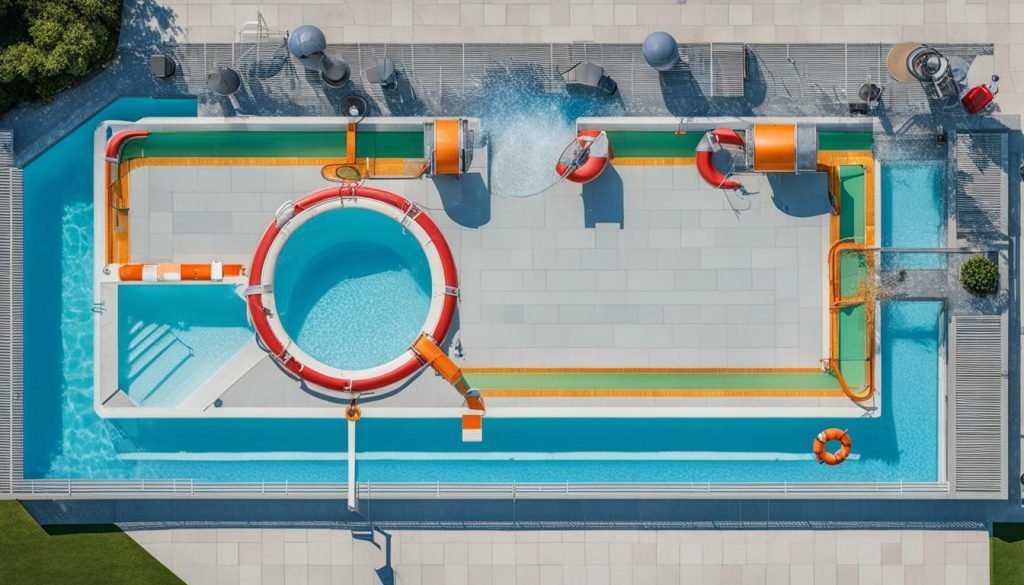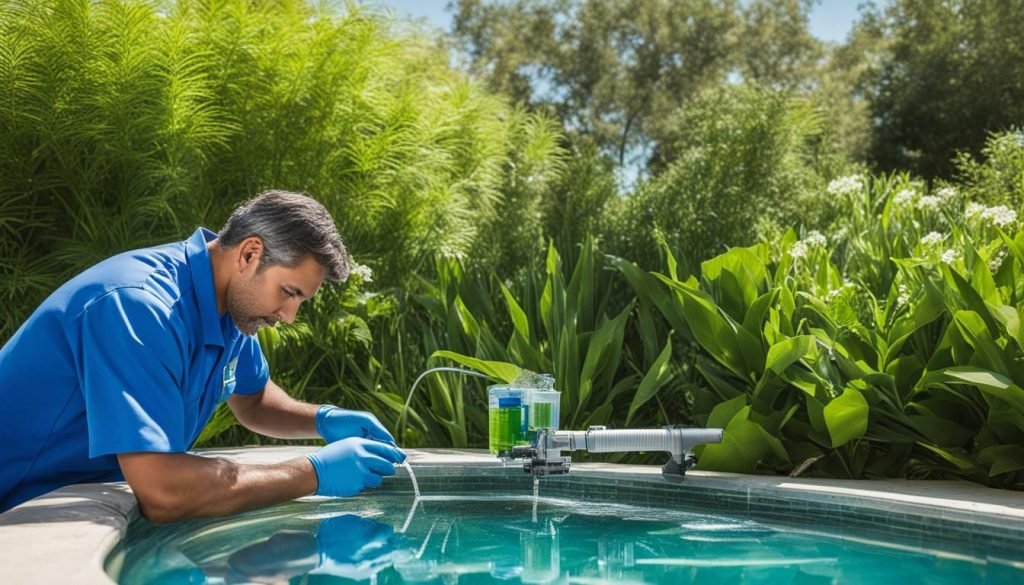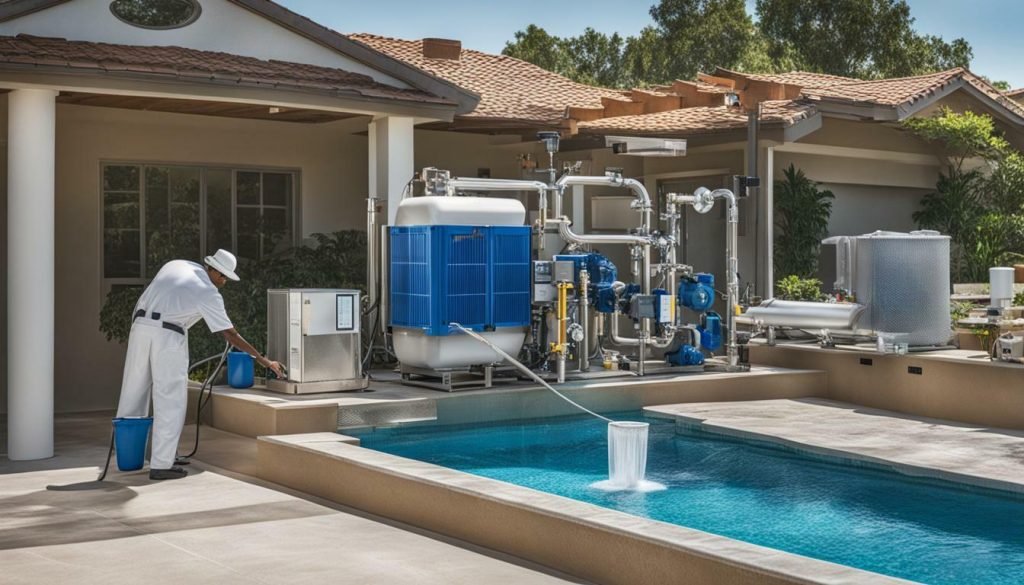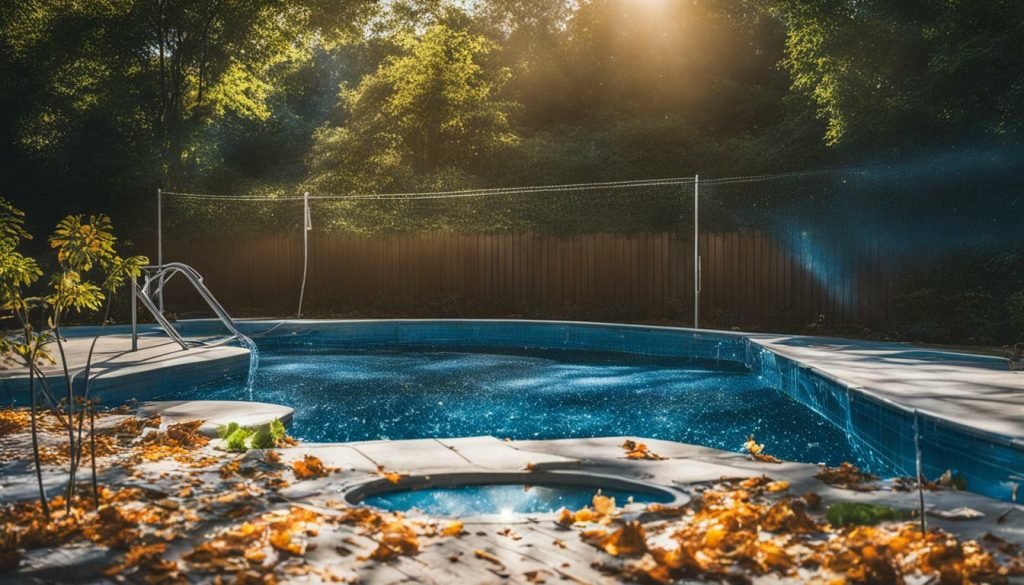Maintaining your pool equipment is essential for keeping your pool in optimal condition and ensuring a safe and enjoyable swimming experience. South Africans are fortunate to have access to beautiful pools, but it’s important to take care of the equipment to ensure longevity and pristine pool conditions. In this article, we will provide expert pool equipment maintenance tips specifically tailored for South Africans.
Key Takeaways
- Regularly balance and maintain the water quality to prevent algae growth and keep the water crystal clear.
- Skim leaves and debris off the water’s surface daily and scrub the sides of the pool regularly to prevent algae build-up.
- Clean and maintain pool equipment, such as pumps, filters, and heating systems, to ensure proper functioning.
- Use pool covers to keep the water clean and conserve heat, and regularly test chlorine levels for adequate disinfection.
- Consider hiring a pool maintenance professional for regular cleaning, chemical balancing, and equipment inspections.
By following these pool equipment maintenance tips, you can enjoy a well-maintained pool all year round. Remember to prioritize safety measures and regularly assess the condition of your pool to prevent accidents and ensure a safe swimming environment.
Importance of Pool Safety Measures
Safety should be your top priority when it comes to owning a pool, and implementing proper pool safety measures is crucial in preventing accidents and ensuring the well-being of everyone using the pool. Whether you are a beginner or an experienced pool owner, it is essential to educate yourself on the necessary precautions and guidelines to maintain a safe swimming environment.
One of the most significant risks associated with swimming pools is the potential for drowning, especially among young children and inexperienced swimmers. By installing adequate barriers, such as pool fences and safety covers, you can prevent unauthorized access to the pool and reduce the chance of accidents.
Additionally, it is essential to educate yourself and others about pool safety rules, including the importance of adult supervision, learning basic swimming skills, and knowing how to respond in case of an emergency. By promoting a culture of safety and awareness, you can create a secure and enjoyable pool environment for everyone.
Pool Safety Tips:
- Always supervise children around the pool and ensure they have proper flotation devices.
- Learn CPR and have a first aid kit readily available near the pool area.
- Install a pool alarm to alert you if anyone enters the water without supervision.
- Regularly inspect and maintain pool equipment to ensure it is in good working condition.
- Teach children how to swim and establish pool rules to prevent risky behaviors.
- Remove any potential hazards, such as toys or tripping hazards, from the pool area.

Remember, accidents can happen in seconds, but with proper safety measures in place, you can significantly reduce the risk and enjoy your pool with peace of mind.
| Pool Safety Equipment | Benefits |
|---|---|
| Pool fences and gates | Prevent unauthorized access and increase safety |
| Safety covers | Protect the pool and reduce the risk of accidents |
| Pool alarms | Alert you if someone enters the pool area without supervision |
| Flotation devices | Provide additional safety for children and non-swimmers |
| CPR training and first aid kits | Enable quick response in case of emergencies |
Balancing and Maintaining Water Quality
Maintaining proper water balance is key to keeping your pool clean, clear, and safe for swimming. Algae can quickly bloom in the pool due to out-of-balance water, high pH, low chlorine, warm temperatures, sunlight, and the presence of nitrates. To prevent algae growth, it is essential to regularly balance and maintain the water in your pool.
To ensure crystal clear water, regularly test and adjust the pH level. A pH level between 7.2 and 7.6 is ideal for pool water. Test kits are available at pool supply stores, and instructions for adjusting the pH can be found in the manufacturer’s guidelines. By maintaining the proper pH level, you can prevent skin and eye irritation and ensure a comfortable swimming experience.
Skimming leaves and debris off the water’s surface daily is another crucial step in maintaining water quality. Floating dirt and debris can contribute to cloudy water and clog the pool filter. Additionally, scrubbing the sides of the pool every second week helps prevent algae build-up, keeping the pool walls clean and inviting.
| Pool Maintenance Tips for Balancing and Maintaining Water Quality: |
|---|
| Regularly test and adjust the pH level of the water |
| Skim leaves and debris off the water’s surface daily |
| Scrub the sides of the pool every second week |
By following these maintenance tips, you can ensure that your pool water remains pristine and enjoyable for everyone. Remember, clean and balanced water is not only visually appealing but also essential for the health and safety of swimmers.

Regular Pool Equipment Maintenance
Regular maintenance of your pool equipment is essential to keep everything running smoothly and prevent costly repairs or replacements in the future. By following a regular pool equipment maintenance schedule, you can ensure that your pool remains in pristine condition throughout the year. Here are some important tips to help you maintain your pool equipment effectively:
- Clean and maintain pumps: Regularly clean the pump baskets and remove any debris that may hinder proper water circulation. Inspect the pump motor for any signs of wear or damage. Lubricate moving parts as necessary.
- Check and clean filters: Clean or replace the pool filter cartridges as recommended by the manufacturer. Regularly backwash the sand filters to remove trapped dirt and debris. Proper filtration is crucial for maintaining clear and healthy pool water.
- Maintain heating systems: Inspect and clean the heating system components, such as heaters and heat exchangers, to ensure optimal performance. Check for any leaks or malfunctioning parts that may require repairs.
“Regular maintenance of your pool equipment is essential to keep everything running smoothly and prevent costly repairs or replacements in the future.”
Additionally, it is important to regularly test the water chemistry and adjust the chemical levels as needed. Properly balanced water chemistry helps prevent algae growth, ensures water clarity, and protects the pool equipment from damage. Regularly skim leaves and debris off the surface of the water, and brush the sides of the pool to prevent algae buildup. These simple maintenance tasks go a long way in maintaining the overall cleanliness and functionality of your pool.
Remember to follow the manufacturer’s instructions for your specific pool equipment and consult a professional if you are unsure about any maintenance procedures. By investing time and effort in regular pool equipment maintenance, you can enjoy a trouble-free swimming experience and extend the lifespan of your pool equipment.

| Pool Equipment | Maintenance Tips |
|---|---|
| Pumps | Clean pump baskets and inspect motor regularly. Lubricate moving parts as necessary. |
| Filters | Clean or replace filter cartridges as recommended. Backwash sand filters regularly. |
| Heating Systems | Inspect and clean heating system components. Check for leaks and malfunctioning parts. |
Additional Tips for Pool Maintenance
In addition to the essential maintenance tasks, there are other tips and practices that can help you keep your pool in great condition year-round. By incorporating these additional tips into your pool maintenance routine, you can ensure that your pool remains clean, safe, and inviting for all to enjoy.
Regular Skimming and Scrubbing:
Skimming leaves and debris off the water’s surface daily is a simple yet effective way to prevent dirt from settling at the bottom of the pool. Additionally, make it a habit to scrub the sides of the pool every second week to prevent algae build-up and keep the pool looking pristine.
Proper Filter Maintenance:
The pool filter plays a crucial role in keeping the water clean by removing dirt, leaves, insects, and other small objects. It’s important to clean the pool filter at least once a week to ensure its optimal functioning. You should also consider backwashing the filter monthly to clean out any dirt or debris that may have accumulated in the system pipes.
Optimal Water Chemical Levels:
To maintain clear and safe water, it’s essential to maintain proper chemical levels. Regularly testing and adjusting the pH levels of the water is necessary to keep it crystal clear. Additionally, using a saltwater chlorinator can provide efficient and cost-effective sanitization, ensuring that your pool remains a healthy environment for swimming.
By following these additional tips, you can enhance the maintenance of your pool and enjoy a sparkling clean swimming experience. Remember, proper pool maintenance not only extends the lifespan of your pool equipment but also ensures the safety and satisfaction of everyone who swims in your pool.

Conclusion
By implementing these pool equipment maintenance tips, you can ensure the longevity of your pool and create a safe and enjoyable swimming experience for you and your loved ones. Safety should always be a top priority when it comes to swimming pools, so it is important to educate yourself on pool safety measures to prevent any accidents or drownings. Regularly balancing and maintaining the water quality is crucial in preventing algae growth and keeping the water crystal clear. By testing and adjusting the pH levels, skimming debris off the surface, and scrubbing the pool regularly, you can maintain pristine conditions.
Regularly cleaning and maintaining pool equipment, such as pumps, filters, and heating systems, is essential to ensure their proper functioning and optimal pool performance. Additionally, maintaining proper water chemical levels and using a saltwater chlorinator can help you achieve clear and safe water for swimming. Consider hiring a pool maintenance professional for regular cleaning, chemical balancing, and equipment inspections, especially if you are not confident in your own maintenance skills.
Using a pool cover not only helps to keep the water clean, but it also conserves heat, saving you on heating costs. Regularly testing and adjusting chlorine levels, using chlorine tablets, and shocking the pool weekly will help in disinfection and keeping bacteria and algae at bay. Lastly, keeping an eye on the water conditions, regularly cleaning the pool deck, and using a pool skimmer and net to remove debris will help you maintain a clean and inviting swimming environment.
FAQ
What are the most common causes of algae growth in a pool?
Algae can quickly bloom in the pool due to out-of-balance water, high pH, low chlorine, warm temperatures, sunlight, and the presence of nitrates.
How often should I balance and maintain the water in my pool to prevent algae growth?
It is recommended to regularly balance and maintain the water in your pool to prevent algae growth. This includes testing and adjusting pH levels, maintaining proper chlorine levels, and regularly cleaning and maintaining the pool filter.
How often should I clean the pool filter?
The pool filter should be cleaned at least once a week to remove dirt, leaves, insects, and other small objects. Additionally, it is important to backwash the filter monthly to clean out the system pipes.
Should I hire a pool maintenance professional?
It is advisable to consider hiring a pool maintenance professional for regular cleaning, chemical balancing, and equipment inspections. They have the expertise and knowledge to ensure your pool remains in optimal condition.
How often should I clean and maintain pool equipment?
It is important to regularly clean and maintain pool equipment, such as pumps, filters, and heating systems, to ensure their proper functioning. Regular maintenance will help prevent any potential issues and prolong the lifespan of your equipment.
How can I keep the pool water clean and conserve heat?
Using a pool cover is an effective way to keep the water clean and conserve heat. It is important to inspect the cover regularly and replace it if damaged.
What should I do to remove floating dirt and debris from the pool?
To remove floating dirt and debris from the pool, use pool cleaning nets and leaf basket skimmers. These tools will help keep the water clear and free from debris.
How can I disinfect the pool water?
Maintaining proper chlorine levels in the pool is key to disinfecting the water. Chlorine tablets can be used to break down dirt particles and ensure the water is safe for swimming.
How can I prevent water accumulation on the pool cover?
To prevent water accumulation on the pool cover, use a cover pump to remove any accumulated water. Additionally, using a pool air pillow can help prevent water accumulation and potential damage.
How often should I check the water conditions before swimming?
It is recommended to regularly check the water conditions before swimming, including clarity, color, and temperature. This will ensure a safe and enjoyable swimming experience.
How often should I shock the pool?
To kill harmful bacteria, algae, and chloramines in the water, it is advised to shock the pool on a weekly basis. This will help maintain clean and clear water.
How can I clean the sides and floor of the pool?
Use a scrub brush to regularly clean the sides and floor of the pool. This will help remove grime and algae buildup, keeping the pool clean and inviting.
